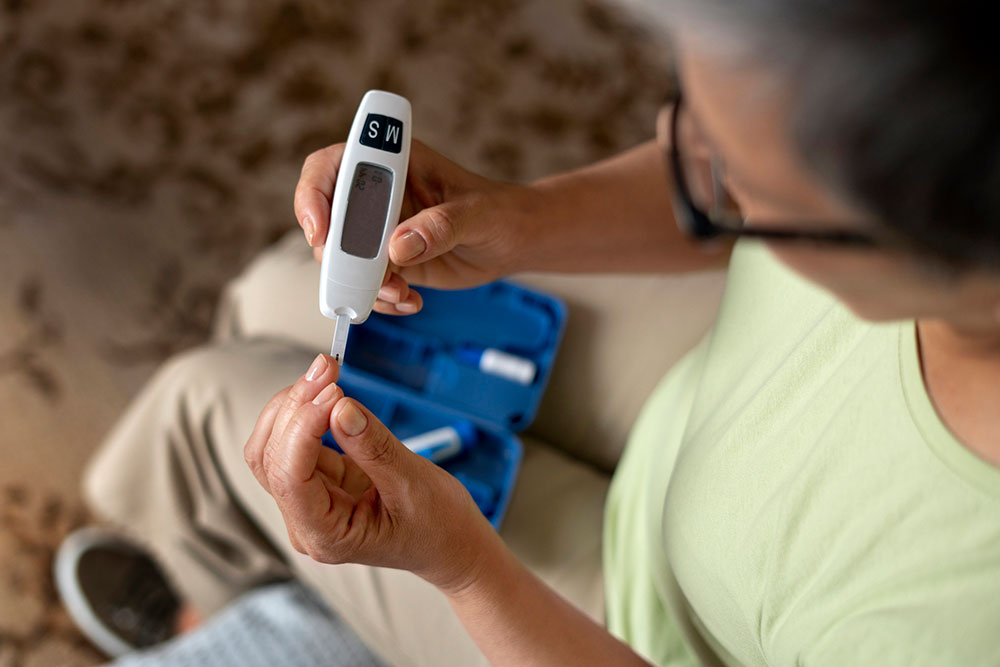Diabetic neuropathy is a type of nerve damage caused by prolonged high blood sugar levels, primarily affecting individuals with diabetes. It can impair nerves throughout the body, commonly in the legs and feet, leading to pain, numbness, and other complications.
Pathophysiology (How does it occur?)
1. Hyperglycemia Damage:
Prolonged high blood sugar damages small blood vessels (micro-angiopathy), reducing blood supply to nerves.
This leads to oxidative stress, inflammation, and accumulation of harmful substances like sorbitol within the nerve cells.
2. Nerve Fiber Damage:
Dysfunction of Schwann cells, which produce myelin (protective nerve coating), leads to slowed nerve conduction and impaired communication.
3. Metabolic Disruption:
Altered metabolism in diabetes results in the formation of advanced glycation end products (AGEs), exacerbating nerve injury.
Types and Symptoms
1. Peripheral Neuropathy:
- Affects hands and feet.
- Symptoms: Burning, tingling, numbness, sharp pain, loss of reflexes, and muscle weakness.
2. Autonomic Neuropathy:
- Affects involuntary functions.
- Symptoms: Digestive issues (gastro-paresis), urinary problems, abnormal sweating, and heart rate irregularities.
3. Proximal Neuropathy:
- Affects hips, thighs, and buttocks.
- Symptoms: Sudden, severe pain, muscle weakness, and difficulty climbing stairs.
4. Focal Neuropathy:
- Affects specific nerves, often in the face or torso.
- Symptoms: Pain in isolated areas, vision changes, Bell’s palsy, or localized weakness.
Causes
- Uncontrolled Blood Sugar: The primary cause leading to nerve damage.
- Inflammation: Chronic inflammation associated with diabetes.
- Reduced Blood Flow: Due to vascular complications of diabetes.
- Oxidative Stress: Due to imbalance between free radicals and antioxidants.
- Genetics: Some individuals may be more predisposed to developing neuropathy.
Risk Factors
- Prolonged duration of diabetes.
- Poor glycemic control.
- Overweight or obesity.
- Smoking and alcohol consumption.
- High blood pressure and cholesterol.
- Advanced age.
Complications
- Foot Ulcers: Due to numbness and poor wound healing.
- Infections: Increased susceptibility in affected areas.
- Amputations: Severe cases may necessitate limb removal.
- Heart and Digestive Issues: Due to autonomic nerve damage.
- Chronic Pain: Reduced quality of life.
Ayurvedic Management of Diabetic Neuropathy
In Ayurveda, diabetic neuropathy is associated with Madhumeha (diabetes) and Vata dosha imbalance. Management focuses on balancing Vata, nourishing nerves, and controlling blood sugar levels.
1. Herbal Remedies
Ashwagandha (Withania somnifera):
Strengthens nerves and reduces oxidative stress.
Shatavari (Asparagus racemosus):
Restores nerve function and balances Vata.
Guduchi (Tinospora cordifolia):
Improves immunity and controls blood sugar.
Turmeric (Curcuma longa):
Anti-inflammatory and antioxidant properties.
Bala (Sida cordifolia):
Strengthens nerves and muscles.
2. Panchakarma Therapies
- Abhyanga (Oil Massage): With medicated oils like Dashamoola or Bala Taila to relieve pain and improve circulation.
- Shirodhara: To relax the nervous system and balance Vata.
- Basti (Medicated Enema): Nourishes and strengthens the nervous system.
- Raktamokshana: To improve blood circulation.
3. Diet and Lifestyle
- Avoid sugar, processed foods, and excessive salt.
- Include bitter foods like Neem, Karela (bitter gourd), and Fenugreek to control blood sugar.
- Stay hydrated and consume a Vata-pacifying diet (warm, cooked foods).
4. Yoga and Pranayama
- Yoga: Poses like Tadasana, Trikonasana, and Vajrasana to improve circulation.
- Pranayama: Anulom Vilom and Bhramari Pranayama to reduce stress and enhance nerve function.
5. Rasayanas (Rejuvenation Therapies)
Herbs like Amalaki (Indian Gooseberry) and Brahmi (Bacopa monnieri) to promote nerve regeneration.
Preventive Measures
- Maintain strict blood sugar control.
- Engage in regular physical activity to improve circulation.
- Avoid alcohol and smoking.
- Practice good foot care, including daily inspection and moisturizing.
- Follow a holistic Ayurvedic regimen for long-term nerve health.
Integrating Ayurvedic principles with modern treatments offers a holistic approach to managing diabetic neuropathy effectively.








